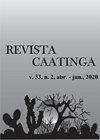Repellent activity of essential oils against mediterranean fly and their effects on postharvest quality in paluma guava
IF 0.9
4区 农林科学
Q3 AGRONOMY
引用次数: 0
Abstract
ABSTRACT Brazil is one of the world's largest guava (Psidium guajava) producing countries, but the economic performance of this crop can be negatively affected by the damage caused by Ceratitis capitata (Diptera: Tephritidae). The main methods for controlling C. capitata are based on broad-spectrum insecticide applications. However, the negative effects of using this control method stimulate the development of sustainable alternatives, such as the use of essential oils (EO). In this sense, the objective of the present study was to evaluate the repellent activity of EO of citronella (Cymbopogon nardus), clove (Syzygium aromaticum), and copaiba (Copaifera officinalis) for repellency of C. capitata in Paluma guava fruits and determine their effects on postharvest fruit quality, under laboratory-controlled conditions. The fruits were treated with citronella, clove, and copaiba EO and placed in covered plastic containers attached to the ends of arenas of 20 cm diameter and 15 cm height. The fruit physical and chemical analysis was carried out based on the same oils applied in the repellent test. The C. nardus essential oil presented a greater repellency of C. capitata females. The EO applications proved to be a good strategy for maintaining the fruit post-harvest quality.番石榴精油对地中海蝇的驱避作用及其对采后品质的影响
摘要巴西是世界上最大的番石榴(Psidium guajava)生产国之一,但这种作物的经济效益可能会受到头角角蟾(Diptera:Tephritidae)造成的损害的负面影响。控制头状锥虫的主要方法是基于广谱杀虫剂的应用。然而,使用这种控制方法的负面影响刺激了可持续替代品的开发,例如精油的使用。从这个意义上说,本研究的目的是在实验室控制的条件下,评估香茅(Cymbopogon nardus)、丁香(Syzygium aromaticum)和科帕依巴(Copaifera officinalis)的EO对番石榴果实中头状C.capita的驱避活性,并确定它们对采后果实质量的影响。用香茅、丁香和copaiba EO处理果实,并将其放置在附在直径20厘米、高度15厘米的竞技场末端的有盖塑料容器中。以驱避试验中使用的相同油脂为基础,对果实进行了理化分析。nardus精油对头状C.capita雌性具有更大的排斥性。EO应用被证明是保持果实采后质量的良好策略。
本文章由计算机程序翻译,如有差异,请以英文原文为准。
求助全文
约1分钟内获得全文
求助全文
来源期刊

Revista Caatinga
AGRONOMY-
CiteScore
2.10
自引率
11.10%
发文量
67
审稿时长
6-12 weeks
期刊介绍:
A Revista Caatinga é uma publicação científica que apresenta periodicidade trimestral, publicada pela Pró-Reitoria de Pesquisa e Pós-Graduação da Universidade Federal Rural do Semi-Árido – UFERSA, desde 1976.
Objetiva proporcionar à comunidade científica, publicações de alto nível nas áreas de Ciências Agrárias e Recursos Naturais, disponibilizando, integral e gratuitamente, resultados relevantes das pesquisas publicadas.
 求助内容:
求助内容: 应助结果提醒方式:
应助结果提醒方式:


